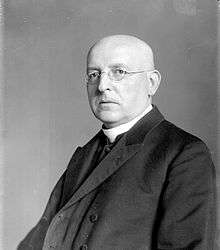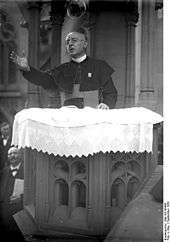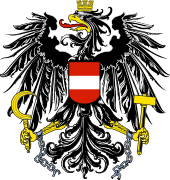Ignaz Seipel
Ignaz Seipel (19 July 1876, in Vienna[1] – 2 August 1932) was an Austrian prelate and politician of the Christian Social Party (CS), who served as Federal Chancellor twice during the 1920s.
Ignaz Seipel | |
|---|---|
 | |
| Chancellor of Austria | |
| In office 20 October 1926 – 4 May 1929 | |
| President | Michael Hainisch Wilhelm Miklas |
| Preceded by | Rudolf Ramek |
| Succeeded by | Ernst Streeruwitz |
| In office 31 May 1922 – 20 November 1924 | |
| President | Michael Hainisch |
| Preceded by | Johann Schober |
| Succeeded by | Rudolf Ramek |
| Minister of Foreign Affairs | |
| In office 30 September 1930 – 4 December 1930 | |
| Chancellor | Carl Vaugoin |
| Preceded by | Johann Schober |
| Succeeded by | Johann Schober |
| In office 20 October 1926 – 4 May 1929 | |
| Chancellor | Himself |
| Preceded by | Rudolf Ramek |
| Succeeded by | Ernst Streeruwitz |
| Personal details | |
| Born | 19 July 1876 Vienna, Austria-Hungary |
| Died | 2 August 1932 (aged 56) Pernitz, Austria |
| Political party | Christian Social Party |
| Alma mater | University of Vienna |
Career
Seipel studied theology at the University of Vienna and was ordained a Catholic priest in 1899. He gained his doctorate in theology in 1903, followed by his habilitation at the University of Vienna, being one of the first scholars writing on business ethics in the context of Catholic social teaching. From 1909 until 1917 he taught moral theology at the University of Salzburg.
Seipel was a member of the clerical conservative Christian Social Party established by the Vienna mayor Karl Lueger in 1893, and served as cabinet secretary in the Austro-Hungarian government during World War I. At that time he also wrote and published a number of famous works, including Nation und Staat (Nation and State) (1916), which helped cement his later prominent role in the party. In these writings, unlike most contemporaries swept up by Wilsonian rhetoric, he saw the state as the primary vindication of sovereignty, rather than the nation.[2] In October 1918 he was appointed Minister for Labour and Social Affairs in the last Cisleithanian cabinet under Minister president Heinrich Lammasch.

After World War I, Seipel, a member of the constituent assembly of German Austria, re-established the formerly monarchist Christian Social Party, now operating – the empire having been lost – in the First Austrian Republic. Party chairman from 1921 until 1930, he served as chancellor between 1922 and 1924, and again from 1926 until 1929, then also as Foreign Minister.
To restore the Austrian economy, Chancellor Seipel and his delegate Mensdorff-Pouilly-Dietrichstein on 4 October 1922 signed the Protocol for the reconstruction of Austria at the League of Nations: by officially renouncing accession to Germany, he obtained an international bond. In order to fight the hyperinflation of the Krone currency, the government at the same time re-founded Austria's central bank Oesterreichische Nationalbank with the task of securing monetary stability. However, these policies let to growing discontent by socialist workers' organizations, and in June 1924 an attempt was made on Seipel's life by a frustrated worker .
Leading a right-wing coalition government supported by the Greater German People's Party and the Landbund, his main policy was the encouragement of cooperation between wealthy industrialists and the paramilitary units of the nationalist Heimwehren. During this time there was an increase in street violence and armed conflicts with the left-wing Republikanischer Schutzbund, culminating in the Vienna July Revolt of 1927 claiming numerous casualties. The Social Democratic opposition thereafter referred to Seipel as the "Bloody Prelate". He finally resigned in 1929 and was succeeded by his party fellow Ernst Streeruwitz. In the following year he once again served in a short-time term as Foreign Minister in the cabinet of Chancellor Carl Vaugoin.
Seipel was assassinated by a socialist[3] during a stay at a sanatorium in the Vienna Woods. He is buried in an Ehrengrab at the Vienna Zentralfriedhof.
Legacy
Seipel's antisemitic manners were the pattern for the character of Chancellor Dr. Schwerdtfeger in Hugo Bettauer's 1922 novel Die Stadt ohne Juden (The City Without Jews), picturized by Hans Karl Breslauer in 1924.
Bibliography
- D. A. Binder: "Seipel Ignaz". In: Österreichisches Biographisches Lexikon 1815–1950 (ÖBL). Vol. 12, Austrian Academy of Sciences, Vienna 2005, ISBN 3-7001-3580-7, p. 142 f. (Direct links to "p. 142", "p. 143")
- Konrad Fuchs (1995). "Ignaz Seipel". In Bautz, Traugott (ed.). Biographisch-Bibliographisches Kirchenlexikon (BBKL) (in German). 9. Herzberg: Bautz. cols. 1357–1358. ISBN 3-88309-058-1.
- Michael Gehler (2010), "Seipel, Ignaz KarlIgnaz Karl", Neue Deutsche Biographie (NDB) (in German), 24, Berlin: Duncker & Humblot, pp. 196–197; (full text online)
- Seipel, Ignaz: Christian statesman in a time of crisis by Klemens Von Klemperer (Princeton University Press, 1972, ISBN 0-691-05197-6)
- Fascist Movements in Austria : from Schönerer to Hitler by F. L. (Francis Ludwig) Carsten (London, 1977, ISBN 0-8039-9992-5, ISBN 0-8039-9857-0)
- Angelo Maria Vitale: Das politische. Denken Ignaz Seipels zwischen Scholastik und Korporativismus, in F. S. Festa, E. Fröschl, T. La Rocca, L. Parente, G. Zanasi (Hrsg.), Das Österreich der dreißiger Jahre und seine Stellung in Europa, Peter Lang Verlag, Frankfurt/Main 2012, ISBN 978-3-653-01670-3
- "From Class Conflict to Class Cooperation: The Evolution of Austrian Cooperation"
- Jamie Andrew McGregor Bulloch, The Promotion of an Austrian Identity 1918-1938, PhD dissertation (Ch. 1 is about Seipel's political theory)
See also Deutsche Nationalbibliothek www:https://web.archive.org/web/20160530191920/https://portal.d-nb.de/opac.htm
References
- http://www.biographien.ac.at/oebl_12/142.pdf
- John W. Boyer, Culture and Political Crisis in Vienna: Christian Socialism in Power, 1897-1918, p. 411.
- https://mises.org/library/cultural-background-ludwig-von-mises
External links
| Wikimedia Commons has media related to Ignaz Seipel. |
- "New Cabinet". Time Magazine. 1926-11-01. Retrieved 2008-08-09.
- Newspaper clippings about Ignaz Seipel in the 20th Century Press Archives of the ZBW
| Political offices | ||
|---|---|---|
| Preceded by Johann Schober |
Chancellor of Austria 1922–1924 |
Succeeded by Rudolf Ramek |
| Preceded by Rudolf Ramek |
Chancellor of Austria 1926–1929 |
Succeeded by Ernst Streeruwitz |
| Preceded by Rudolf Ramek |
Foreign Minister of Austria 1926–1929 |
Succeeded by Ernst Streeruwitz |
| Preceded by Johann Schober |
Foreign Minister of Austria 1930 |
Succeeded by Johann Schober |
